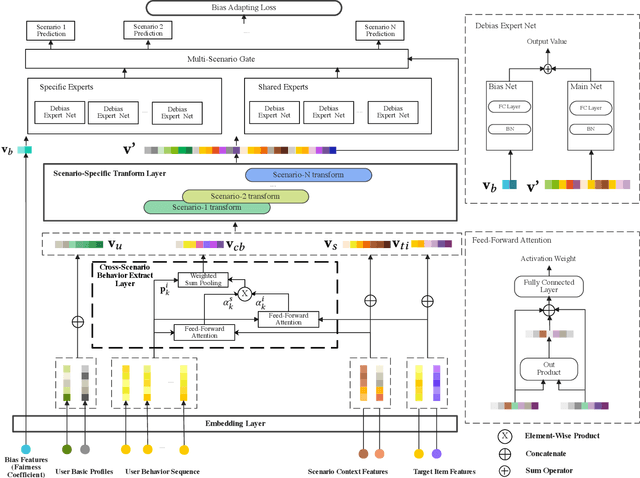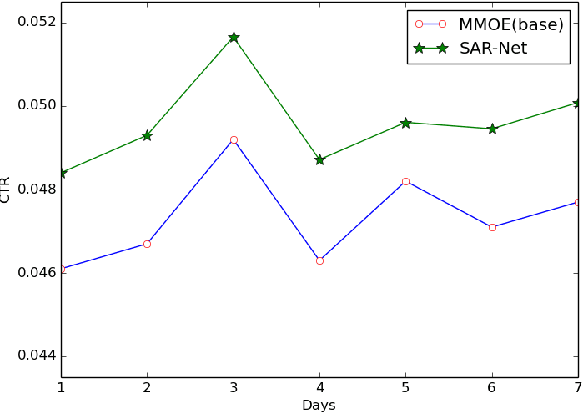Wanjie Tao
Cold-Start based Multi-Scenario Ranking Model for Click-Through Rate Prediction
Apr 16, 2023Abstract:Online travel platforms (OTPs), e.g., Ctrip.com or Fliggy.com, can effectively provide travel-related products or services to users. In this paper, we focus on the multi-scenario click-through rate (CTR) prediction, i.e., training a unified model to serve all scenarios. Existing multi-scenario based CTR methods struggle in the context of OTP setting due to the ignorance of the cold-start users who have very limited data. To fill this gap, we propose a novel method named Cold-Start based Multi-scenario Network (CSMN). Specifically, it consists of two basic components including: 1) User Interest Projection Network (UIPN), which firstly purifies users' behaviors by eliminating the scenario-irrelevant information in behaviors with respect to the visiting scenario, followed by obtaining users' scenario-specific interests by summarizing the purified behaviors with respect to the target item via an attention mechanism; and 2) User Representation Memory Network (URMN), which benefits cold-start users from users with rich behaviors through a memory read and write mechanism. CSMN seamlessly integrates both components in an end-to-end learning framework. Extensive experiments on real-world offline dataset and online A/B test demonstrate the superiority of CSMN over state-of-the-art methods.
SAR-Net: A Scenario-Aware Ranking Network for Personalized Fair Recommendation in Hundreds of Travel Scenarios
Oct 19, 2021



Abstract:The travel marketing platform of Alibaba serves an indispensable role for hundreds of different travel scenarios from Fliggy, Taobao, Alipay apps, etc. To provide personalized recommendation service for users visiting different scenarios, there are two critical issues to be carefully addressed. First, since the traffic characteristics of different scenarios, it is very challenging to train a unified model to serve all. Second, during the promotion period, the exposure of some specific items will be re-weighted due to manual intervention, resulting in biased logs, which will degrade the ranking model trained using these biased data. In this paper, we propose a novel Scenario-Aware Ranking Network (SAR-Net) to address these issues. SAR-Net harvests the abundant data from different scenarios by learning users' cross-scenario interests via two specific attention modules, which leverage the scenario features and item features to modulate the user behavior features, respectively. Then, taking the encoded features of previous module as input, a scenario-specific linear transformation layer is adopted to further extract scenario-specific features, followed by two groups of debias expert networks, i.e., scenario-specific experts and scenario-shared experts. They output intermediate results independently, which are further fused into the final result by a multi-scenario gating module. In addition, to mitigate the data fairness issue caused by manual intervention, we propose the concept of Fairness Coefficient (FC) to measures the importance of individual sample and use it to reweigh the prediction in the debias expert networks. Experiments on an offline dataset covering over 80 million users and 1.55 million travel items and an online A/B test demonstrate the effectiveness of our SAR-Net and its superiority over state-of-the-art methods.
 Add to Chrome
Add to Chrome Add to Firefox
Add to Firefox Add to Edge
Add to Edge